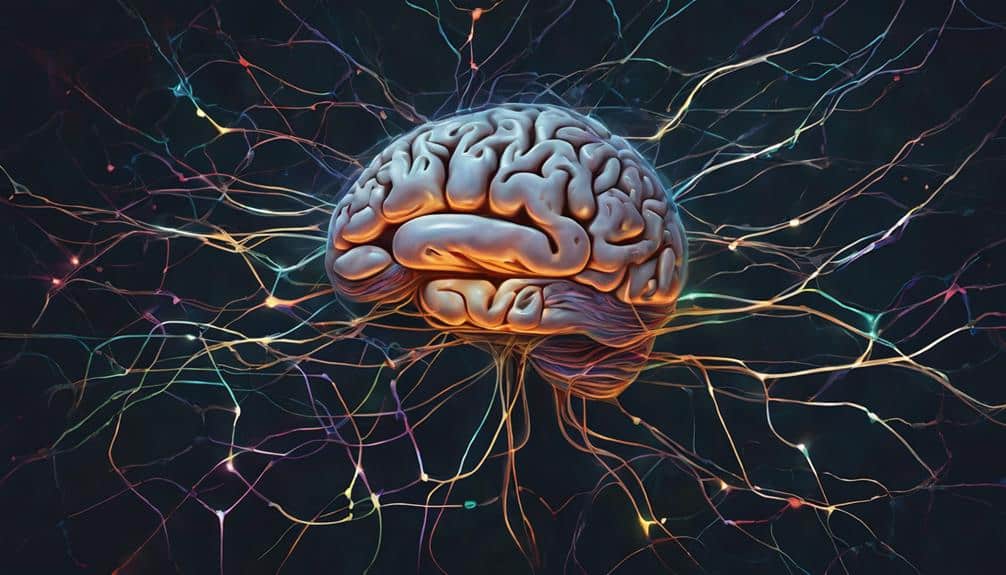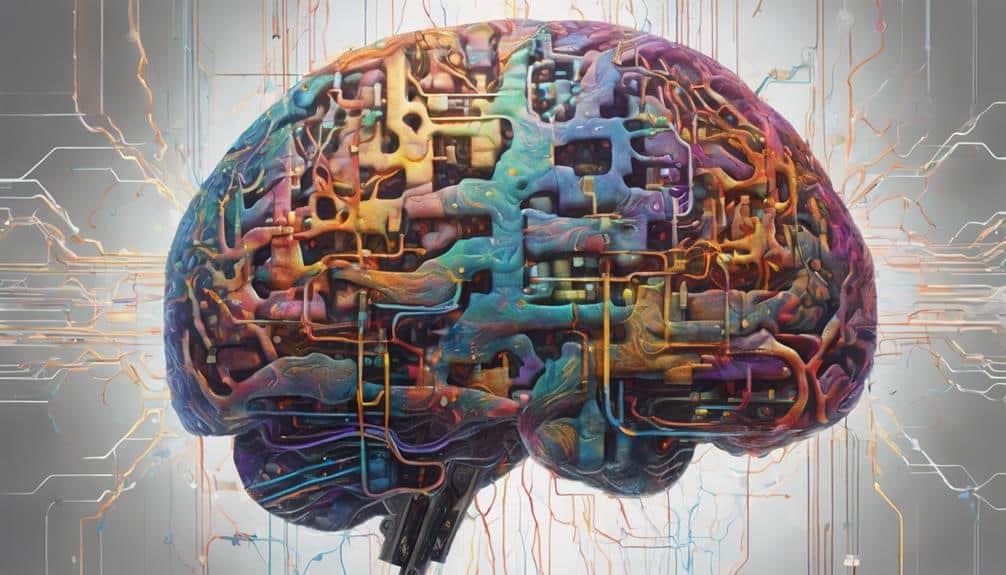Acquired Neurodivergent
Imagine a successful architect who, after a stroke, developed difficulties with memory and organization, impacting their ability to work as they once did.
The journey of adjusting to acquired neurodivergence is complex and multifaceted. Understanding the challenges faced by individuals who experience these changes is essential in fostering inclusivity and support.
By exploring the nuances of acquired neurodivergence, we can gain insight into the resilience and adaptability of the human brain, shedding light on the importance of tailored accommodations to enhance quality of life and productivity.
Key Takeaways
- Acquired neurodivergence stems from injuries or health conditions altering brain function.
- Tailored interventions are crucial for supporting individuals with acquired neurodivergence.
- Trauma can trigger acquired neurodivergence, necessitating targeted interventions and understanding.
- Support systems need to be trauma-informed, promoting acceptance and tailored accommodations.
Understanding Acquired Neurodivergence

Acquired neurodivergence encompasses alterations in brain function resulting from injuries or health conditions experienced throughout an individual's life. This category includes various mental health conditions such as OCD, PTSD, and Bipolar Disorder. OCD affects 1 in 100 people, while PTSD can impact up to 10% of the population, with Bipolar Disorder often emerging during adolescence.
Acquired Brain Injuries (ABI), including traumatic brain injuries, can have profound effects on individuals and their families, leading to changes in cognitive functioning and behavior.
Understanding acquired neurodivergence is vital for promoting neurodiversity and providing appropriate support. Trauma, whether physical or psychological, can trigger acquired neurodivergence, leading to a range of cognitive and emotional challenges. Recognizing the impact of conditions like OCD, PTSD, and Bipolar Disorder within the framework of acquired neurodiversity is essential for developing tailored interventions and support systems.
Neurodiversity Affirming Experiences

Neurodiversity affirming experiences prioritize the celebration and embrace of the unique strengths and perspectives found in neurodivergent individuals. These experiences promote inclusivity and understanding of diverse cognitive processes and behaviors. They aim to create supportive environments that value neurodiversity as a natural variation in human cognition. Neurodiversity affirming experiences encourage acceptance and accommodation to enhance the well-being and success of neurodivergent individuals.
Here are four key aspects of neurodiversity affirming experiences:
- Challenging Stigmas: By recognizing and honoring neurodiversity, these experiences help challenge the stigma surrounding neurodivergence.
- Promoting Acceptance: They foster an environment that promotes acceptance of individuals with diverse neurological profiles.
- Enhancing Knowledge and Understanding: These experiences contribute to increasing knowledge and understanding of neurodiversity within society.
- Creating Trauma-Informed Support: They provide trauma-informed support to individuals who may have experienced traumatic experiences related to their neurodivergence.
Trauma's Impact on Neurodivergence

High comorbidity between trauma and neurodivergence, such as Autism, ADHD, OCD, and Tourette's Syndrome, underscores the intricate interplay between adverse experiences and the development of neurodivergent conditions. Research in neuroscience highlights how trauma can lead to structural brain changes that affect environmental processing.
Individuals who've experienced trauma often exhibit alterations in brain structures that impact their ability to interpret and respond to their surroundings. Additionally, childhood physical and psychological trauma can greatly contribute to the onset or exacerbation of neurodivergent conditions.
Understanding the relationship between trauma and neurodivergence necessitates considering early life experiences and their profound effects on brain development. By delving into the mechanisms through which trauma influences brain function and structure, we can gain valuable insights into how adverse experiences shape neurodivergent conditions.
This knowledge is essential for developing targeted interventions and support systems that cater to individuals affected by both trauma and neurodivergence.
Acquired Brain Injuries and Neurodivergence

When considering acquired brain injuries and neurodivergence, it's imperative to understand the intricate impacts these injuries can have on cognitive functions and mental health.
Traumatic brain injuries, strokes, and conditions like Parkinson's disease can all lead to diverse neurological outcomes, highlighting the complexity of acquired neurodivergence.
Recognizing the nuances of these conditions is paramount for accurate diagnosis and the development of tailored treatment strategies to address the multifaceted effects of ABIs and related mental health conditions.
Brain Injury Impacts
Acquired brain injuries, stemming from various insults to the brain throughout one's life, profoundly impact individuals and their families, altering the course of their lives and presenting complex behavioral challenges.
- Traumatic brain injuries (TBIs) are a subset of acquired brain injuries, often resulting from external force or impact to the head.
- Memory difficulties and cognitive function alterations are common consequences of acquired brain injuries like strokes or encephalitis.
- Challenging behaviors may emerge post-acquired brain injury due to changes in brain function and structure.
- Providing appropriate support and accommodations is essential in helping individuals with acquired neurodivergence navigate the challenges posed by their brain injury.
Neurodiversity Awareness
Following brain injury impacts, it becomes imperative to raise awareness about neurodiversity, particularly in the context of acquired brain injuries and their effects on cognition and behavior. Acquired Neurodiversity encompasses conditions such as Obsessive Compulsive Disorder (OCD), Post-Traumatic Stress Disorder (PTSD), Bipolar Disorder, depression, and anxiety, all of which can result from traumatic brain injuries or other acquired brain injuries like strokes or encephalitis.
These conditions greatly impact neurocognitive functioning, leading to challenges in daily life activities, social interactions, and emotional regulation. Understanding the diverse range of mental health illnesses under acquired neurodivergence is vital for providing appropriate support, tailored treatment plans, and access to mental health resources to enhance the quality of life for individuals living with these conditions.
Exploring Acquired Neurodiversity Examples

An individual's neurodiversity can be shaped by various acquired conditions like OCD, PTSD, Bipolar Disorder, and Acquired Brain Injuries, each presenting unique challenges and potential for improvement.
- OCD affects approximately 1 in 100 people and is considered an acquired neurodivergence that can be improved with appropriate interventions.
- PTSD, which can impact up to 10% of the population, affects around 2.5 million individuals and is characterized as an acquired neurodivergence due to changes in brain structure following traumatic events.
- Bipolar Disorder, often displaying alternating periods of mania and depression, typically surfaces during adolescence and is classified as a neurodivergent condition with potential for enhancement.
- Acquired Brain Injuries (ABI), encompassing insults to the brain during one's lifetime, can result in challenging behaviors, including traumatic brain injuries (TBI) as a subset, altering individuals' trajectories significantly.
Understanding and supporting acquired neurodiversity entails advocating for workplace accommodations, mental health resources, and community inclusion programs to facilitate the well-being and integration of neurodiverse individuals.
Embracing Neurodiversity in the Workplace

Exploring the integration of neurodiversity in the workplace reveals a pivotal approach towards fostering innovation and inclusivity among teams. Embracing neurodiversity not only acknowledges the unique strengths that neurodivergent individuals bring to the table but also leads to increased creativity within the workforce. By providing accommodations tailored to the specific needs of neurodivergent employees, organizations can enhance employee satisfaction and retention rates.
Inclusive communication strategies play a pivotal role in creating a work environment where all team members feel a sense of belonging and acceptance. Accepting neurodiversity not only promotes diversity but also contributes to building a more resilient workplace culture.
Understanding and supporting neurodivergent employees is vital for maximizing overall team performance and productivity. By creating a workplace that embraces neurodiversity, organizations can tap into a wealth of untapped potential and drive innovation forward. Through acceptance and inclusion, companies can create a space where all employees, regardless of neurodiversity, can thrive and contribute meaningfully to the organization's success.
Frequently Asked Questions
What Are the Examples of Acquired Neurodivergence?
Examples of acquired neurodivergence can stem from traumatic events, stroke effects, or brain injuries. Environmental factors can also play a role, leading to cognitive changes, behavioral shifts, learning difficulties, memory impairments, and neurological conditions.
How Did I Become Neurodivergent?
I became neurodivergent through a complex interplay of various factors like brain injury, genetic predisposition, traumatic events, and environmental influences. These elements, alongside neurological changes, developmental disorders, and aging processes, contribute to my neurodivergent identity.
How Can You Tell if You're Neurodivergent?
I can tell I'm neurodivergent by recognizing common signs, seeking diagnosis, finding support, understanding triggers, managing symptoms, exploring therapies, embracing identity, maneuvering work, and building community. These steps help me embrace my unique neurotype.
What Is the Difference Between Innate and Acquired Neurodivergence?
When comparing innate and acquired neurodivergence, the key distinction lies in their origins: nature versus nurture. While innate conditions are present from birth, acquired neurodivergence arises later in life due to factors like injury or trauma.
Conclusion
To sum up, acquired neurodivergence is a complex and diverse phenomenon that deserves recognition and accommodation.
Embracing neurodiversity in all its forms can lead to a more inclusive and understanding society.
The impact of trauma and acquired brain injuries on neurodivergence can't be overstated, highlighting the need for support and understanding.
Let's aim to create a world where every individual, regardless of their neurological differences, is valued and empowered.







